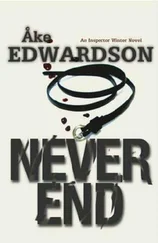“My God.”
“It was a chair. ”
“My God again.”
He stopped rubbing. She saw that his eyes had taken on a different light, as though they had turned inward. It was as though he, all of him, had turned inward.
“And at the same time, I knew it was my fault. Do you understand? That I was the cause of my own rage, or whatever it’s called. That I was the biggest reason that we had ended up in that situation. That I was the one who was splitting up my family, was just about to do it. And that made me so desperate that I lashed out.” He seemed to snap back from inside himself and now he was looking at her. “There’s a paradox, huh? You hit your way out of your own responsibility.”
She didn’t answer.
“But those few times I’m talking about, when I hit something, it was dead things.”
Dead things, she thought. There’s another expression.
She had seen dead things. Halders had seen dead things. It was part of the job. Part of the routine of the job. Routine: What was a body that no longer had a life?
Calm down, Aneta. This evening isn’t part of the routine. There’s a man lying on your sofa and you’re sitting on the floor with pictures of summer happiness and soon you’ll both be sitting at the kitchen table eating and drinking something good. There’s a light in here, in this room. You don’t need to drag in the shadows right now. Kontômé is lighting up the room, lighting the way.
“ Try to hit your way out of responsibility,” she said. “You can’t escape.”
“There are so many people who try,” said Halders.
She got up. The photographs still lay on the floor like a sunburst. That was a good expression. It summed up the content and mood of these pictures.
“And are going to try again,” she said.
Winter turned around in the doorway and watched the sleeping Elsa. She held her arm tight around her stuffed animal, Pelle, a black and white panda whose head was bigger than Elsa’s. Pelle studied Winter as he stood there. Pelle never dropped his gaze. Pelle’s face expressed a belief in the future.
“She knows all the books inside and out,” he said. Angela was sitting on the sofa with Femina magazine in her lap. “She recites them for me. Like an actress.” He was standing in the middle of the room. “Until she falls asleep.” He stretched his arms upward; they had become stiff in Elsa’s bed. “I think Pelle knows them all too, but he doesn’t say anything.” He brought his arms down. “But Elsa talks enthusiastically until she crashes in the middle of a sentence.”
“Or you do.”
“Not tonight,” he said.
She looked up.
“Can’t you fix something?” she said.
“Something? What kind of something?”
“Something. Something good.”
He walked across the hall to the kitchen.
There was phyllo dough and eggs and dill and butter, and a little smoked salmon left over from last Sunday. White pepper.
He drank a glass of white wine while the packets were in the oven. They smelled good. He listened to Wynton Marsalis on the little Panasonic in the kitchen. Or Marsalis was on, but he wasn’t really listening. He watched the multilayered blanket of dough rise up over its contents.
He carried the tray into the living room. Angela was sitting with her legs tucked under her and she was looking out at the sky, which was clear and dark above Vasaplatsen.
“Mmm,” she said.
He poured some wine.
“It is Tuesday, after all,” she said, raising her glass.
“Tuesday all week,” he said, toasting.
She sliced into her packet and inhaled.
“Ahhh!”
“I try my best,” he said. “I try to make the most of my limited abilities.”
“I like you anyway, Erik,” she said, smiling.
“You haven’t tasted it yet.”
They drank coffee in the dark. The only light was the nighttime light of the city, outside. It was constant, like an eternal day.
“This used to be called ‘sitting twilight,’” said Angela. “One of the nurses on my ward says it sometimes.”
“Good expression.”
“Mmhmm.”
“Is that what it’s called in German too?” asked Winter. “Is there an expression like that?”
“No idea.”
Angela was originally from Germany, old East Germany actually, die sogenannte DDR, Leipzig, an old, devastated center of culture according to her father, and that was why he took his wife and their only child at the time, a son, and moved to Berlin, East Berlin. Soon after, he had seen the wall, die Mauer, rise up against the free sky; that was in 1961. Surgeon Günther Hoffmann had seen this from one of the large windows at the hospital that had ended up in the shadow of the wall; the lower floors were already dark in the early afternoon.
The next year they had made it across, hidden in the chassis of two VW Beetles. Günther Hoffmann had been sure that his wife and son would manage; the arrangement was based on that. He came later, when it was dangerous but possible.
He tried to live in West Berlin but felt that the city pushed him away with its gaudy Western neon lights. This wasn’t his country. These were not his fellow citizens. He wasn’t even the cousin from the country. In the light of the advertising signs, even black Leipzig began to glow like some sort of memory of loss. It was an insane thought.
Doctor Hoffmann felt like a stranger in both of his homelands, and he suffered the consequences. He spoke with his wife and son again. They journeyed north across the sea.
He removed the final n in his last name and became Hoffman. He saw it as yet another consequence. A new era of life.
He got a job at Sahlgrenska Hospital in Gothenburg and found peace. His daughter Angela was born in 1967, in the summer.
“Known as the Summer of Love,” Angela had said once, in the beginning, and explained to the free-form jazz nut Winter what had happened in the Haight-Ashbury district of San Francisco in the summer of 1967-the flowers; the people just hanging around, which still seemed to have been something special to experience; the music: the Grateful Dead, Jefferson Airplane, Peanut Butter Conspiracy. She had bought records from that time; it was her year, after all. Erik had laughed at Airplane but listened to the twin guitarists in Quicksilver Messenger Service on the live album Happy Trails with some interest. “These guys could have been something on the jazz scene,” he had said. “They sure can play.” She had put on “Eight Miles High” by the Byrds once, and Erik had flown out of the easy chair during Roger McGuinn’s intro: “But that’s Coltrane!” Later she had found that he was correct. In an interview she’d read in Mojo, McGuinn had said that he had been looking for John Coltrane’s particular atonal tenor sax in that guitar solo. The guy could play.
She got up and turned on a floor lamp near the opposite wall. The light was warm.
He was going to call Steve Macdonald soon.
He needed to say something to Angela first.
“I had a visitor from my past today,” he said.
“That sounds ominous,” she said.
“An old girlfriend.”
“I don’t know if I want to hear this,” she said.
“With emphasis on ‘old,’” he said.
“Well, what did she want?”
Her tone was not exactly warm, not like the light from the lamp.
He explained.
“He hasn’t been gone for that long,” said Angela.
“No.”
“But I would probably have gotten worried myself,” she said.
“Mmhmm.”
“What can you really do?” she asked.
“We can put out a missing person notice and issue a description of course, internationally. Interpol, as usual.”
Читать дальше












